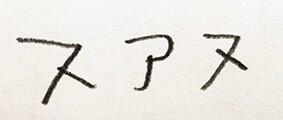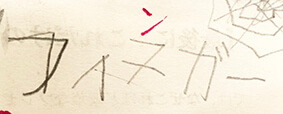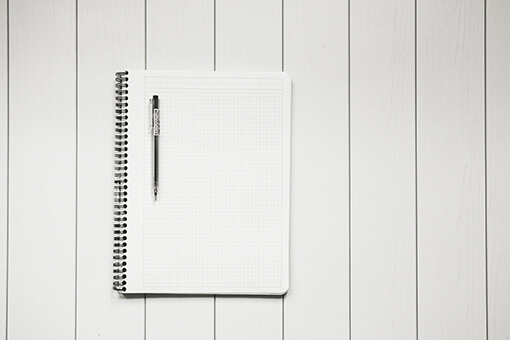Hello. It’s konkaz (@konkazuk) here.
We are going to investigate how an alphabet “N” is meant to be pronounced with this article.
If you would like to improve your Katakana English and make it sound closer to your ideal English pronunciation, you must know that the way how each alphabet is pronounced in English is quite different from how it’s done in Japanese.

If you are blindly trying to copy native speaker’s pronunciation without looking at how each alphabet is being pronounced, you will have ended up making an absolutely time-consuming effort which is basically to copy formidable amount of vocabularies.
If we could grab some sort of tendencies or rules of how each alphabet is being pronounced, we can apply them to all the vocabularies we know, therefore it will be a great shortcut and more effective way than trying to nail every single vocabulary’s pronunciation.
Well anyway, let’s have a look!
Where does extra “n” come from?

Right.
First of all, I suppose everybody has learnt that we need to put “an” instead of “a” before countable nouns (or adjectives which come before countable nouns) that begin with vowel sound during compulsory education…
(For those who don’t remember it, please read this article.)
👉 Beat out those bloody articles!!!《Eigo-jiru vol.16》
For example…
- an apple
- an American lady
- an empty house
And when they are pronounced, they sound like the letter “n” from “an” and the vowel from a noun (or an adjective) are getting connected…
example ①
- anaple
- anamerican lady
- anempty house
But… weird thing is that they actually sound more like…
example ②
- an–napple
- an–namerican lady
- an–nempty house
You can hear the element of “n” on both article “an” and the beginning of the noun or adjective with the “n”-sound integrated.
…So, what is going on here?

The reason why this seemingly inconsistent thing happens to us is because…
our Japanese ”Katakana"alphabet 「ン」 , which is an equivalent word of “n” in English, is pronounce slightly differently, therefore, if any English words that finish with the letter “n” such as station, fashion, pigeon, and so on (not limited to “an” of article) are written in “Katakana” we will experience some kind of weirdness when the words are followed by the word beginning with vowel sound.
However, this might sound still abstract to you…

But please keep reading so that you might find out how English alphabet “n” is different from Katakana’s 「ン」.
“nu” comes after “n” ???

I have a couple of little kids, and am occasionally giving them a task of writing some vocabularies in Katakana, but anyway, please have a look at the following images…
These are written by my daughter, but can you figure out what they are???



From the left (or from the top, if you are with your mobile), they are meant to be… プレイン (plain), ドルフィン (dolphin), and サン (sun), [do not worry about the fact that サ is written as スア at this point] , however…
somehow,“ン” (n)has been transformed into”ヌ” (nu) (…just like plainu, dolphinu, and sunu)
And if you have a look at her other results…



They are meant to be… レインボー (rainbow), フィンガー (finger), and パイナップル (pineapple), but again you can see that”ン” (n)has become”ヌ” (nu) (…just like rainubow, finuger, and pinuapple).
However, interestingly, this does not happen only in their writing, but also it happens when they speak in Japanese…
「窓の外にムーヌが見えるよ。」
(= I can see the moonu outside the window.)
「ここのライヌがちょっと曲がってる。」
(= The linuis not really straight.)
「シルベスター・スターローヌ顔から血ィ出てるよ。」
(= Sylvester Stallonu is bleeding in his face!)
As you can see, “nu” has been substituted for “n” or “ne”.

By the way, you can sometimes catch this “nu”-sound from the vocabularies that are ending with the letter “n” or “ne” while you are listening to people having conversations or while you are listening to some music…
Here is a good example that I have spotted in the song called “God save the Queen” by Sex Pistols / about 01:17,
and it goes…
“God save the Queeeenu!” ♩♫ 🇬🇧
Here, you can clearly hear “nu” (ヌ) -sound.
The other example is the song called “One After 909” by The Beatles (in their “Let it be” album) and it happens about 00:10…
It sounds like “Onuafter Nainuo Naine” (One After 909)
And it sounds even more obvious towards the end of the song around 02:34.
Before they finish with the last “9-0-9〜” bit (Nainuo naaaaaaieee 〜 ♪♫)they repeat the line which is…
“She said she’s traveling on the one after 9-0”
twice, and this “9-0” can be clearly heard as …
“Nainuou”
How this “nu“-sound is brought about is that…
when alphabet “n” is pronounced in English, the tip of your tongue is touching between the back of your upper front teeth and the gum, and if you release your tongue fromits position while “n”-sound is still resonating, it will cut the “n” sound, and that’s when “nu” sound is generated. That’s why it sounds like “n-nu”.
For example, when the words such as “situation” and “generation” are pronounced, even if the letters “nu” are not included in the words themselves, they will be naturally added when you try to cut the “n” sound …like “situation-nu” or “generation-nu”.

On the contrary, when “tion”-part of these words (situation & generation) is pronounced in Katakana (Japanese alphabet for loan-words), you can see yourself that your lip is shaped round and stuck out with your mouth slightly open and the tip of your tongue is touching the bottom of your lower gums.
In this case, when you start pronouncing “tio“-part of the word “situation”, your mouth is open as wide and round as when the letter “o” is pronounced, and the gap between your upper teeth and lower teeth are created.
And subsequently “n“-sound is created by your throat that gets naturally closed while your mouth is still open. Therefore there is no need for cutting “n“-sound that keeps resonating with English pronouncing way.
Hence no “nu”-sound will be generated.
Based on these facts, after pronouncing the letter “n” of article “an” with English way, which is while you are letting the tip of your tongue touching the inner part of your upper gum with “nnnnnn〜” noise going on, pull your tongue off the gum with making “nu”-sound, move on to the vowel sound of the next word, and it will be like…
- an–nu apple
- an–nuhour
- an–nu accident
And then, if you connect “nu“-sound with the vowel sound of the next word, it will sound like “na”
- an–napple
- an–nour
- an–naccident
Umm? This looks familiar, doesn’t it?
It has got the same structure as the “example ②” in the previous chapter!
Hence, it is not that “na“-sound is created by simply combining “n“-sound of article “an” and following vowel sound “a” of apple, American, accident, etc. it is created by combining the “nu“-sound that is brought about by cutting resonating “nnnnnn〜” noise, and the following vowel sound “a” of next word. “nu” + “a” → ”nua” → “na“

Incidentally, as for the last word from my daughter’s Katakana writing, which is “pineapple”, I guess it should be written as “パインアップル” (pineapple) if it was followed by normal Katakana-writing procedure, but the majority of the spelling we use for the word is “パイナップル” (pinenapple)…how come?
The same explanation, which is what happens when article “an” is followed by the word starting with vowel sound can be applied to this situation.
pine (パイン) + nu (ヌ) + apple (アップル)
and when both sounds “nu” (ヌ) and “a” (ア) are connected, it will create “na” (ナ) sound in Katakana, so it makes sense.
Therefore, from now on, when we pronounce the letter “n”, why don’t we place the tip of our tongue at the back of the upper front teeth (to be exact, it is to be positioned on our gum rather than on the back of our front teeth) and imagine “nu” (ヌ) sound is following after “n” (ン) rather than letting “n”(ン) sound naturally created by your throat?
This will help transforming “n” sound in Katakana into English “n” sound.
Pronunciation of the vocabularies that start with letter “n”

So, what about the pronunciation whose words start with letter “n”?
Well, I’m going to explain the mechanism of it piece by piece… so, hopefully things will be worked out nicely.
The first thing I want you to know is when the letter “n” is pronounced, your mouth is closed and the tip of your tongue is touching the inner part of your upper gum and teeth. So, basically this position is set in your mouth before you start pronouncing letter “n”.
And then when it actually comes to pronouncing the letter “n”, if you release the tip of your tongue from its position while “n”-sound is still resonating like “nnnnnn〜”, it will cut the “n” sound, and “nu” sound will be generated. Therefore as a whole, it will sound like “n-nu”.
Anyway, here are 5 vocabularies that start with letter “n”…
nice, Nick, noodle, neck, novice
If you remove the letter “n” from these, and write them in Katakana, they will be…
アイス、イク、ウードル、エク、オヴィス、
(aɪs, ɪk, uːdl, ek, ɒvɪs)
… you can see that they are starting with vowel sound 「アイウエオ」”a, i, u, e, o“

Now, we put the letter “n” back to these vocabularies and if we pronounce the letter “n” as “n-nu” as I had explained earlier, it could be spelt as…
ンヌアイス、ンヌイク、ンヌウードル、ンヌエク、ンヌオヴィス、
(n-nuaɪs, n-nuɪk, n-nuuːdl, n-nuek, n-nuɒvɪs)
And this time, these vocabularies are not in the same condition as the ones that are ending with letter “n” and are followed by the words beginning with vowel sound, but are simply the ones that begin with letter “n” ([“n”+ vowel] is happening within a single vocabulary but not the combination of two words), hence, instead of going through the same procedure, it should go naturally like…
ンナイス、ンニク、ンヌードル、ンネク、ンノヴィス
(n-naɪs, n-nɪk, n-nuːdl, n-nek, n-nɒvɪs)
To get straight to the point, it’s like you are totally ready to pronounce the 1st “n” letter {the one that is put before the hyphen in the example above} with your teeth engaged and the tip of your tongue in its position, but actually you suddenly decide not to pronounce it and simply move on to the 1st sound of the actual vocabulary {the one after the hyphen}, which are… na, ni, nu, ne, nɒ.
During the daily conversation, you will probably not be able to understand this feeling if you don’t have the sense of it, however, when the vocabularies that begin with letter “n” are pronounced with emphasis, (when things are desperate) for example…
“I neeeedittt!!!! (I need it.)
You can feel the sense of “n” in your throat before actually pronouncing “need”.
or when you are blamed for something you haven’t been involved, you would go…
I dounnou!!!! (I don’t know.)
Again, the sense of “n” can be felt in your throat before pronouncing “know”.
*(Vocabularies whose spelling begin with consonant letter but pronunciation start with vowel sound such as “knock”, “know”, etc. are treated the same)
As you can see from these examples, even if the sound “n” is not generally pronounced , it is surely there and sleeping before the vocabularies that begin with letter “n”.
Summary

- The vocabularies that end with letter(s) “n” or “ne” such as “situation” and “fine” are followed by the sound of “nu”.
- As for the vocabularies that begin with letter “n”, firstly you engage your teeth and set the tip of your tongue in its position as if you were going to pronounce the sound of “n”, and while you are totally ready for doing it, you actually don’t pronounce it and move on to the 1st sound of the actual vocabulary, which are na, ni, nu, ne, nɒ.
Anyway, this is it for the article about English pronunciation of “n”…
Acquiring English pronunciation is not an easy task, but hopefully what I have explained here will make sense and will be helpful for you.
Thanks for reading till the end.
konkaz

